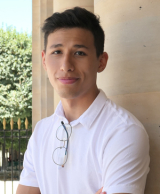MiCM Scholars program - Meet the 2019 Summer Scholars
Applicants of the summer 2019 MiCM scholar program, share what they learned from
their experience after participating in the program.

Name: Marco Jiralerspong
Department: Computer Science and Economics (Faculty of Arts)
Can you tell me a bit about yourself?
I’m a U2 student at McGill majoring in Computer Science and Economics. While I haven’t studied biology in a while, I’ve always been interested in genetics. With multiple McGill CS professors also being involved with Biology, I’ve come to realize how powerful connecting both fields can be and thus wanted to learn more about Bioinformatics.
Can you tell us about the type of work you were involved in this summer?
I started the summer by helping a research project on the DPYD gene (linked to the metabolization of a common cancer treatment). Since loss-of-function variants of this gene can lead to death when using this cancer treatment, INESSS recommends testing for four variants before proceeding with treatment.
The goal of the research project was to show how the variants that are recommended for testing do not include enough variants to provide adequate protection for all ethnic groups. To assist the project, I wrote scripts to parse and filter VCF files and create figures from them illustrating the issue.
Then, I worked on created a series of Python workshops to teach biologists with no programming experience the basics of coding as well as common and useful Python libraries for Bioinformatics (pandas and matplotlib).
I also contributed to the development of a web interface for the GREAT project (a study on breast cancer) to make it easy for the associated researchers to manage the study and the data it generates.
What did you gain from this experience (i.e knowledge, skills)?
On the Bioinformatics side, I gained a better understanding of genetics, how our genome/exome is analyzed as well as the various databases/tools that exist to analyze it.
In general, I learned how to better communicate and break down technical information, how to collaborate with coworkers on software projects with tools such as git. I also learned how to use cloud computing clusters to perform large, time consuming computations.
What would you say to students applying next year?
Don’t worry if you don’t have much experience with Biology. You’ll be surrounded by people who do and that will be happy to answer any questions you might have.
Anything else you would like to contribute about your internship experience?
The internship was fun, interesting and challenging (in a good way). I learned a lot and it was great to have the opportunity to work on a wide variety of different projects.

Name: Wan-Chun Su
Department: Computer Science and Biology
Can you tell me a bit about yourself?
I am an undergraduate student at McGill University going into my fourth year. I am interested in the intersection of computational biology, AI, and machine learning and enjoy learning about the role of computational approaches in the field of medicine and healthcare.
Can you tell us about the type of work you were involved in this summer?
I participated in the development and application of a novel hierarchical polygenic risk score model with the purpose of gaining insight into the molecular phenotype and endophenotype regulatory networks that are involved in complex psychiatric and neurodegenerative diseases.
This involved programming scripts for processing and manipulating functional genomic data and summary statistics at the SNP, gene, endophenotype and disease level and employing mathematical approaches to estimate the hierarchical effect sizes at these different levels.
What did you gain from this experience (i.e knowledge, skills)?
I acquired experience in processing and interpreting large-scale data and employing bioinformatics tools for genome-wide association analyses. I also became familiar with applying quantitative methods to analyze genetic data, which has helped me recognize the importance of interdisciplinary knowledge in biological data analysis.
What would you say to students applying next year?
Be open to learning from multiple disciplines. You’ll be working with people from different disciplines and applying approaches from various areas of research which will require you to explore and delve into new and unfamiliar fields.
Anything else you would like to contribute about your internship experience?
I’m grateful to the MiCM and Professor Yue Li for giving me the opportunity to contribute research efforts to such an important field. This internship has allowed me to gain not only valuable research experience, but also a better appreciation of computational methods in medicine.

Name: Yuxue Zhu
Department: Biology and computer science
Can you tell me a bit about yourself?
I am an undergraduate student in Honour biology and computer science program. I am interested in programing and analyzing data. This summer, I worked in Celia Greenwood lab to help them to process DNA methylation dataset and summarize the information. Apart from programming, I like traveling around the world to have a taste of different culture and see the scenes of nature.
Can you tell us about the type of work you were involved in this summer?
I worked on Hydra server and compute Canada to collect DNA methylation data and analyze them by R language.
There are 4 main projects I worked on:
Blueprint (Downloaded the methylation files using EGA python client, Got metadata though GemBS pipline, Merged strands information for each samples, Merge the methylation data of samples at each chromosome.)
Luigi Bouchard (Summarized the DNA methylation information of cord and placenta for each chromosome, Compared the estimated results of cell type based on three different methods, Visualized the result and form the report in R markdown.)
BORIS (Calculated the correlation between boris and 4 datasets, Identified modules in Metastatic and Primary Tumor samples by WGCNA package.)
Miltiadis Paliouras (Downloaded the sra files from dbGaP dataset, Processed encrypted files into fastq files.)
What did you gain from this experience (i.e knowledge, skills)?
- Basic syntax of R language and bash script.
- Usage of R markdown to represent the report and genomic analysis package like minfi, GemBS.
- Learnt how to visualize data in R.
- How to collect data from online datasets.
- How to use remote server to manage data.
- Technique of processing big dataset.
- Analysis the correlation between multivariable.
What would you say to students applying next year?
Don’t hesitate to apply for it!
You can learn a lot in practice rather than in class and apply the knowledge you learnt to the real projects. You could also meet many wonderful people who will be willing to help you with difficulties.
Anything else you would like to contribute about your internship experience?
It is a very good opportunity for students to integrate the knowledge to solve the problems in real projects and I have not only learned a lot of useful knowledge, but also improved my comprehensive abilities. Also, this internship makes me clearer about my pockets of knowledge, which is good for my future studying.
